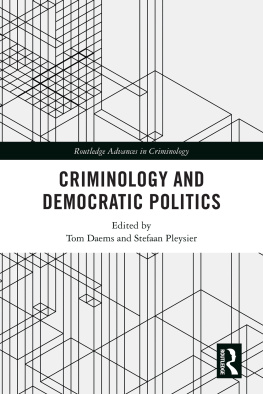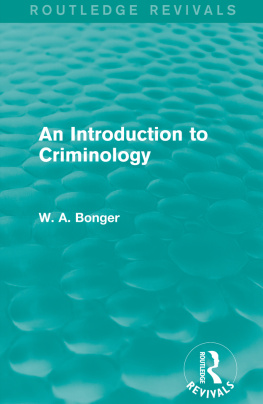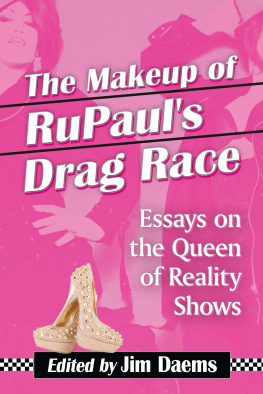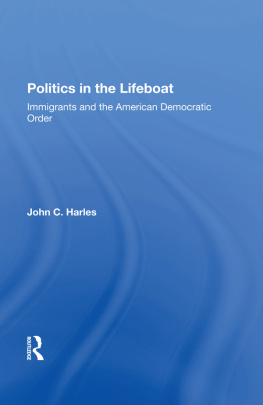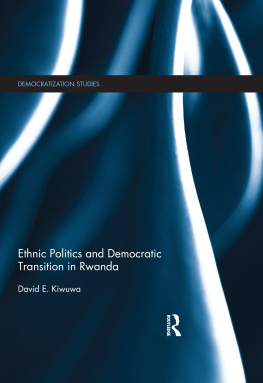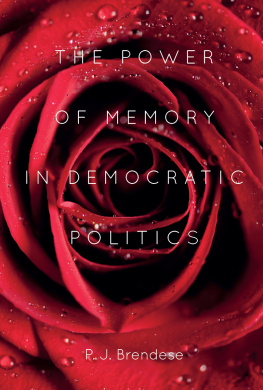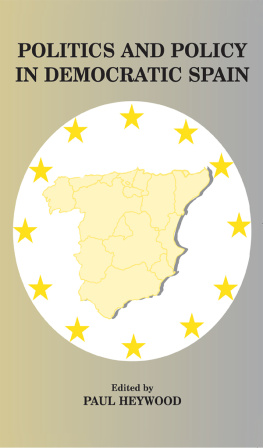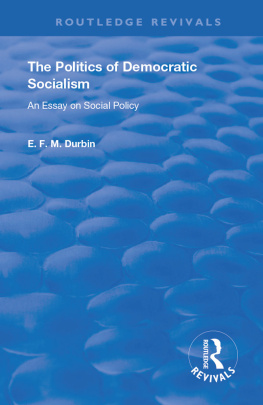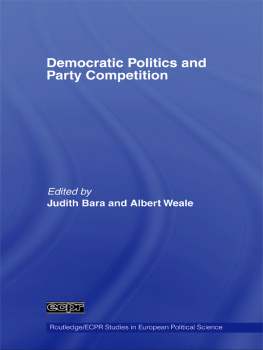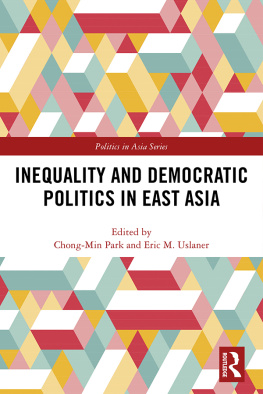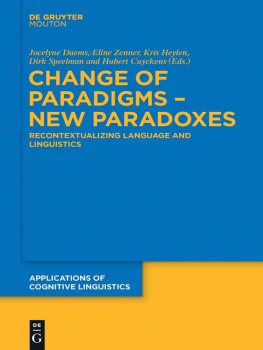This compendium of original essays has been written in honour of Richard Sparkss voluminous and exceptional contributions to scholarship. With contributions from across the globe this edited collection will appeal to many and hopefully stimulate debate about the critical role of criminology in democratic politics.
Kerry Carrington,
Queensland University of Technology, Australia
This is a deeply personal book, but also an original and exciting contribution to the fields of democratic politics and public criminology. It honours, represents, and develops Richard Sparks professional work beautifully, amongst many other things. The editors should be congratulated on this project: a work of originality, collegiality and love.
Alison Liebling,
University of Cambridge, UK
This is a superb book on an urgent, important topic. Building on Richard Sparks seminal work on public criminology, a distinguished group of international contributors presents a wide-ranging discussion of criminologys role in the democratic process and considers how we can go about creating a better politics of crime and control. This is an edited collection that deserves to be read and re-read.
David Garland,
New York University, USA
Criminology and Democratic Politics
Routledge Advances in Criminology
Drugs and Popular Culture in the Age of New Media
Paul Manning
Criminal Justice in International Society
Edited by Willem de Lint, Marinella Marmo, and Nerida Chazal
American Smuggling as White Collar Crime
Lawrence Karson
Young Men and Domestic Abuse
David Gadd, Claire L. Fox, Mary-Louise Corr, Steph Alger and Ian Butler
Frank Tannenbaum: The Making of a Convict Criminologist
Matthew G. Yeager
Reinforcement Sensitivity Theory
A Metatheory for Biosocial Criminology
Anthony Walsh
Mafia Violence
Political, Symbolic, and Economic Forms of Violence in Camorra Clans
Edited by Monica Massari and Vittorio Martone
Analytical Criminology
Integrating Explanations of Crime and Deviant Behavior
Karl-Dieter Opp
Uniting Green Criminology and Earth Jurisprudence
Jack Lampkin
Social Bridges and Contexts in Criminology and Sociology
Reflections on the Intellectual Legacy of James F. Short, Jr.
Edited by Lorine A. Hughes and Lisa M. Broidy
Criminology and Democratic Politics
Edited by Tom Daems and Stefaan Pleysier
For more information about this series, please visit: https://www.routledge.com/Routledge-Advances-in-Criminology/book-series/RAC
Criminology and Democratic Politics
Edited by
Tom Daems and Stefaan Pleysier
First published 2021
by Routledge
2 Park Square, Milton Park, Abingdon, Oxon OX14 4RN
and by Routledge
52 Vanderbilt Avenue, New York, NY 10017
Routledge is an imprint of the Taylor & Francis Group, an informa business
2021 selection and editorial matter, Tom Daems and Stefaan Pleysier; individual chapters, the contributors
The right of Tom Daems and Stefaan Pleysier to be identified as the authors of the editorial material, and of the authors for their individual chapters, has been asserted in accordance with sections 77 and 78 of the Copyright, Designs and Patents Act 1988.
All rights reserved. No part of this book may be reprinted or reproduced or utilised in any form or by any electronic, mechanical, or other means, now known or hereafter invented, including photocopying and recording, or in any information storage or retrieval system, without permission in writing from the publishers.
Trademark notice : Product or corporate names may be trademarks or registered trademarks, and are used only for identification and explanation without intent to infringe.
British Library Cataloguing-in-Publication Data
A catalogue record for this book is available from the British Library
Library of Congress Cataloging-in-Publication Data
Names: Daems, Tom, editor. | Pleysier, Stefaan, editor.
Title: Criminology and democratic politics/edited by Tom Daems and Stefaan Pleysier.
Description: Abingdon, Oxon; New York, NY: Routledge, 2021. |
Series: Routledge advances in criminology | Includes bibliographical references and index. Identifiers: LCCN 2020035269 |
ISBN 9780367421175 (hardback) | ISBN 9780367821906 (ebook) Subjects: LCSH: CriminologyPolitical aspects. | Criminal justice, Administration ofPolitical aspects. | DemocracySocial aspects. Classification: LCC HV6025 .C74567 2021 | DDC 364dc23
LC record available at https://lccn.loc.gov/2020035269
ISBN: 978-0-367-42117-5 (hbk)
ISBN: 978-0-367-82190-6 (ebk)
Typeset in Times New Roman
by Deanta Global Publishing Services, Chennai, India
Contents
Tom Daems and Stefaan Pleysier
Tom Daems and Stefaan Pleysier
John Braithwaite
Ian Loader
Mximo Sozzo
Anthony Bottoms
Tim Newburn
Tom Daems
Bas van Stokkom
Tim Hope
Letizia Paoli, Jonas Visschers, An Adriaenssen, Susanne Karstedt and Victoria A. Greenfield
Luc Robert
Alistair Henry
Antoinette Verhage
Cyrille Fijnaut
Richard Sparks
In June 2018, we were informed that KU Leuven, upon our nomination, would confer upon Professor Richard Sparks the degree of doctor honoris causa . After passing through the gremia of the university, that decision was formally communicated to Professor Sparks in a letter of 19 October 2018 signed by Professor Luc Sels, the rector of KU Leuven. A few days later, we received a letter of acceptance from Professor Sparks. This proved to be the official start of a truly exciting year for our criminology institute in Leuven, which celebrated its 90th anniversary in 2019.
The official ceremony took place on 25 April 2019. It was followed by a public lecture by Professor Sparks with the title Beyond the Rendez-vous. Criminology, Critique, Connection. The ceremony was preceded by the two-day international conference Criminology and Democratic Politics. For this conference, we had invited scholars from different parts of the world to reflect on the central theme of the conference, in particular by engaging with some of the themes in the oeuvre of Richard Sparks. There were four sessions, which reflect the key areas in his body of work: Punishment, knowledge and penal politics, Crime, fear and the media, Democratic politics and the (ab)uses of criminological knowledge and Public criminology and criminologys public role. All plenary speakers were subsequently invited to contribute a chapter to this book. This resulted in thirteen chapters (chapters three to fifteen of this volume). In addition, in April 2020 we conducted an interview with Richard Sparks which has been included as chapter two. Richard also agreed to offer some final reflections, not only on the chapters in this volume but also on some pressing issues of our current epoch (COVID-19, police violence, etc.). These reflections became a full, stand-alone chapter which is the final contribution in this book (chapter sixteen).
We are grateful to all speakers at the conference and, in particular, to those who were able to contribute a chapter to this book. This conference would not have been possible without the generous support of the Faculty of Law of KU Leuven. We have been incredibly fortunate to receive financial and logistical support to organize the conference and to welcome our national and international guests in Leuven in, so we believe, the best conditions possible. For this we are very grateful to the Faculty Board, in particular former dean Professor Bernard Tilleman and administrative director Monique Vandyck and her staff. We are also grateful to our colleagues at the Leuven Institute of Criminology (LINC) for supporting the nomination of Richard Sparks for the doctorate honoris causa , for chairing sessions, contributing to the round-tables, and participating in the celebrations of 90 years of criminology in Leuven. Stijn Vivijs, the coordinator of LINC, again proved to be invaluable in helping with organizational and practical matters. The alumni association VALC kindly sponsored the reception after the first day of the conference. We are also grateful to Tom Sutton and his team for welcoming this volume to the Routledge publishing programme and offering help and support in preparing and finalizing the manuscript. Last but not least, a huge thank you to Richard Sparks. For us, this book is the end-point of what has been an intense, yet highly enjoyable and intellectually stimulating journey. It also offered us an excellent opportunity and excuse to prepare the festivities, share our plans, and discuss criminology, and much more, with Richard, often over dinner, from Sarajevo over Heverlee to Leuven.


